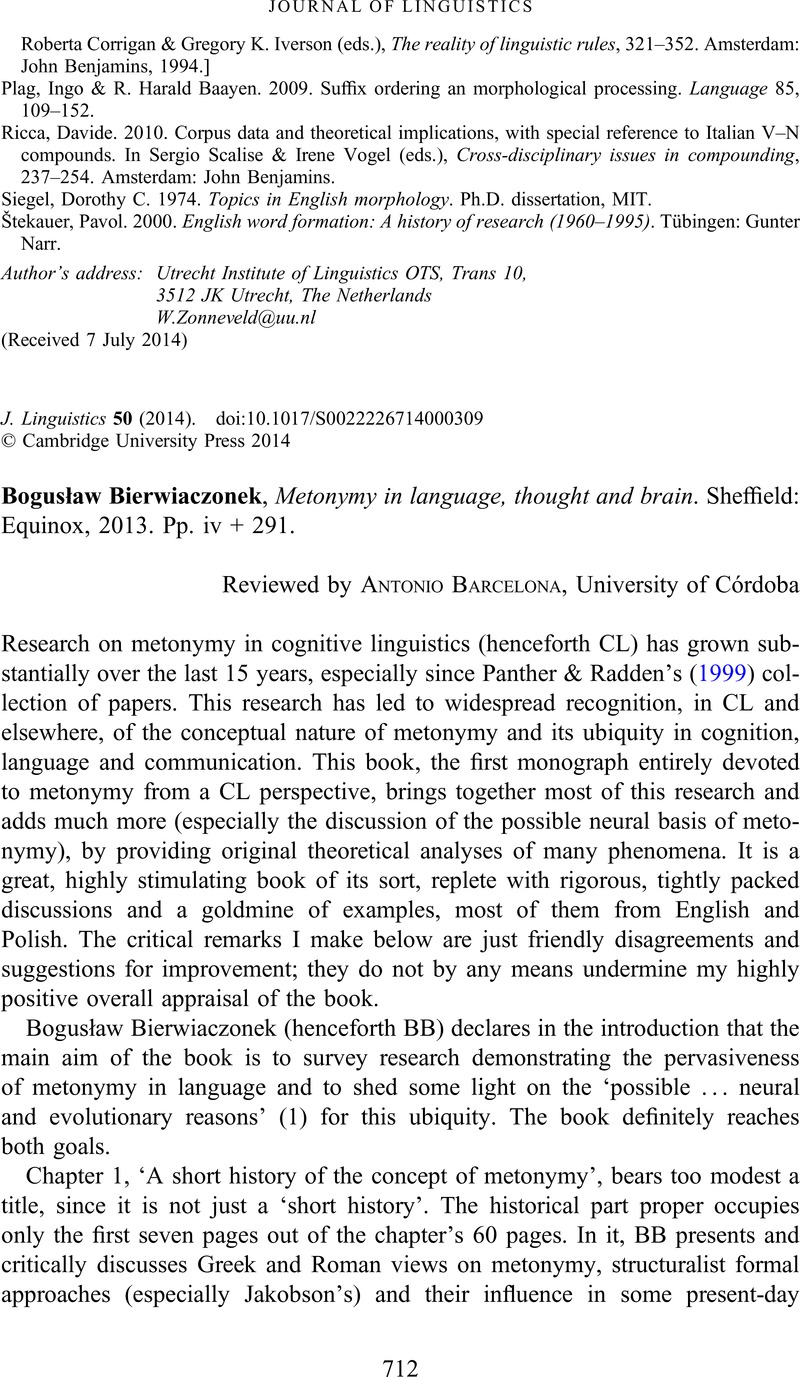No CrossRef data available.
Article contents
Bogusław Bierwiaczonek, Metonymy in language, thought and brain. Sheffield: Equinox, 2013. Pp. iv + 291.
Published online by Cambridge University Press: 15 October 2014
Abstract
An abstract is not available for this content so a preview has been provided. Please use the Get access link above for information on how to access this content.

- Type
- Reviews
- Information
- Copyright
- Copyright © Cambridge University Press 2014
References
REFERENCES
Barcelona, Antonio. 2003. The case for a metonymic basis of pragmatic inferencing: Evidence from jokes and funny anecdotes. In Panther, & Thornburg, (eds.), 81–102.Google Scholar
Barcelona, Antonio. 2004. Metonymy behind grammar: The motivation of the seemingly ‘irregular’ grammatical behavior of English paragon names. In Radden, & Panther, (eds.), 357–374.Google Scholar
Barcelona, Antonio. 2005. The multilevel operation of metonymy in grammar and discourse with particular attention to metonymic chains. In José, Francisco, de Mendoza Ibáñez, Ruiz & Cervel, Sandra Peña (eds.), Cognitive linguistics: Internal dynamics and interdisciplinary interaction (Cognitive Linguistics Research 32), 313–352. Berlin: Mouton de Gruyter.Google Scholar
Barcelona, Antonio. 2008. The interaction of metonymy and metaphor in the meaning and form of ‘bahuvrihi’ compounds. Annual Review of Cognitive Linguistics 6, 208–281.Google Scholar
Barcelona, Antonio. 2011. Reviewing the properties and prototype structure of metonymy. In Benczes, et al. (eds.), 7–57.Google Scholar
Benczes, Réka, Barcelona, Antonio & Ruiz de Mendoza Ibáñez, Francisco-José (eds.). 2011. Defining metonymy in cognitive linguistics: Towards a consensus view (Human Cognitive Processing 28). Amsterdam: John Benjamins.Google Scholar
Bierwiaczwonek, Bogusław. 2007. On formal metonymy. In Kosecki, Krzysztof (ed.), Perspectives on metonymy (Łódz Studies in Language 14), 43–67. Berlin: Peter Lang.Google Scholar
Cruse, Alan. 2000. Meaning in language: An introduction to semantics and pragmatics. Oxford: Oxford University Press. [3rd edn. in 2011]Google Scholar
Gibbs, Raymond W. Jr. 1994. The poetics of mind: Figurative thought, language, and understanding. Cambridge: Cambridge University Press.Google Scholar
Kövecses, Zoltán & Radden, Günter. 1998. Metonymy: Developing a cognitive linguistic view. Cognitive Linguistics 9.1, 37–77.Google Scholar
Lakoff, George. 1987. Women, fire and dangerous things: What categories reveal about the mind. Chicago, IL: The University of Chicago Press.Google Scholar
Lakoff, George & Johnson, Mark. 1980. Metaphors we live by. Chicago, IL: The University of Chicago Press.Google Scholar
Nunberg, Geoffrey. 1978. The pragmatics of reference. Bloomington, IN: Indiana University Linguistics Club.Google Scholar
Norrick, Neil R. 1981. Semiotic principles in semantic theory. Amsterdam: John Benjamins.Google Scholar
Panther, Klaus-Uwe & Radden, Günter (eds.). 1999. Metonymy in language and thought. Amsterdam: John Benjamins.Google Scholar
Panther, Klaus-Uwe & Thornburg, Linda L.. 1999. The potentiality for actuality metonymy in English and Hungarian. In Panther, & Radden, (eds.), 333–357.Google Scholar
Panther, Klaus-Uwe & Thornburg, Linda L. (eds.). 2003. Metonymy and pragmatic inferencing (Pragmatics and Beyond New Series 113). Amsterdam: John Benjamins.Google Scholar
Panther, Klaus-Uwe & Thornburg, Linda L.. 2007. Metonymy. In Geeraerts, Dirk, Dirven, René & Cuyckens, Hubert (eds.), Handbook of cognitive linguistics, 236–263. Oxford: Oxford University Press.Google Scholar
Klaus, Panther, Thornburg, Linda L. & Barcelona, Antonio (eds.). 2009. Metonymy and metaphor in grammar (Human Cognitive Processing 25). Amsterdam: John Benjamins.Google Scholar
Peirsman, Yves & Geeraerts, Dirk. 2006. Metonymy as a prototypical category. Cognitive Linguistics 17.3, 269–316.CrossRefGoogle Scholar
Radden, Günter & Panther, Klaus-Uwe. 2004a. Introduction: Reflections on motivation. In Radden, & Panther, (eds.), 1–46.Google Scholar
Günter, Radden & Panther, Klaus-Uwe (eds.). 2004b. Studies in linguistic motivation (Cognitive Linguistic Research 28). Berlin & New York: Mouton de Gruyter.Google Scholar
Ruiz de Mendoza Ibáñez, Francisco José. 2000. On the role of mappings and domains in understanding metonymy. In Barcelona, Antonio 2000 (ed.), Metaphor and metonymy at the crossroads: A cognitive perspective, 109–132. Berlin & New York: Mouton de Gruyter.Google Scholar
Ruiz de Mendoza Ibáñez, Francisco José & Usón, Ricardo Mairal. 2007. High-level metaphor and metonymy in meaning construction. In Radden, Günter, Koepcke, Klaus-Michael, Berg, Thomas & Siemund, Peter (eds.), Aspects of meaning construction, 33–49. Amsterdam: John Benjamins.Google Scholar
Seto, Ken-Ichi. 1999. Distinguishing metonymy from synecdoche. In Panther, & Radden, (eds.), 91–120.Google Scholar


